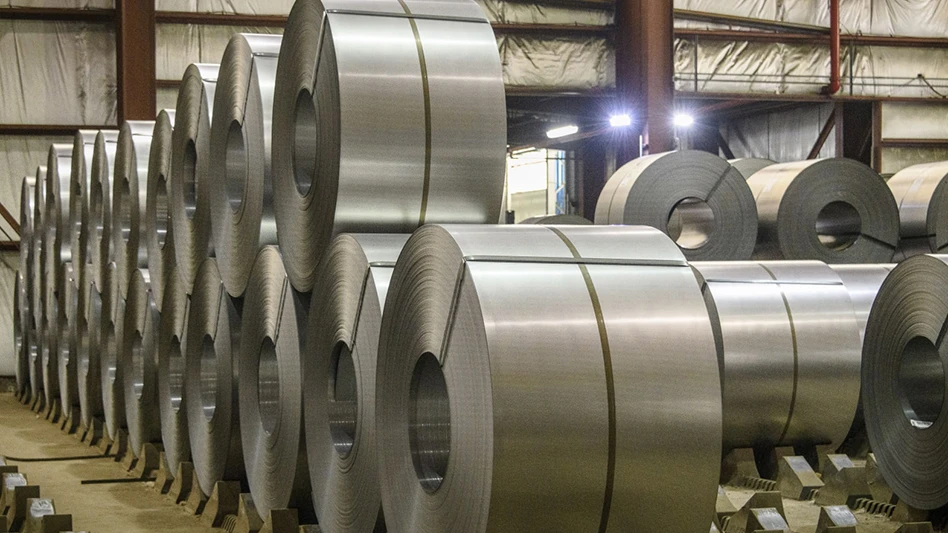For years recycling has been touted to communities and governments as a way to reduce waste and help the environment. But as the economy worsened and unemployment rose, recycling advocates started telling another story about the benefits that go along with recycling, and that includes job growth and increased revenue.
The Southeast Recycling Development Council (SERDC) is made up of members from Alabama, Arkansas, Florida, Georgia, Kentucky, Louisiana, Mississippi, North Carolina, South Carolina, Tennessee and Virginia who work toward developing and promoting sustainable recycling programs. In late May 2011, the SERDC hosted a webinar titled “The Economic Impact of Recycling: Using Economic Numbers to Boost Support for Recycling in the Southeast,” providing its members with statistics to back up the claim that growing recycling is a feasible way to bring thousands of jobs and millions of dollars to the region.
Will Sagar, SERDC policy director, shared the results of a two-year study the organization conducted that shows the impact recycling has on the manufacturing sector. It focused on manufacturers that rely on recycling feedstock to produce consumer goods. The study did not include collection entities, processors, material recovery facilities (MRFs) or supply side businesses or organizations; it focused on manufacturing jobs, which Sagar referred to as “the Holy Grail of the economic development community.”
FEEDING MANUFACTURING
The findings showed 206 manufacturers across the 11-state SERDC region that use recycled feedstock in their products, employing 47,525 people with an annual combined sales revenue of $29.4 billion.
“This is just not a revenue stream, this is a revenue river,” Sagar remarked. “SERDC maintains its position that strong local supply of this material will allow these manufacturers to get the feedstock that they depend on to grow their industries.”
He said some of the nation’s and the world’s largest recyclers are located in the Southeastern United States and, currently, they have to look far beyond the Southeast, and even overseas, to get the secondary commodities they need to feed their facilities and reach full production capacity.
In Alabama, according to the study, 26 facilities employ 10,700 people and generate $6.6 billion in annual sales. KW Plastics, Troy, Ala., which, according to Sagar, is the largest recycler of HDPE (high-density polyethylene) in the country, accounts for 195 full-time jobs, $6.6 million in annual payroll, $4.4 million in annual utility bills and $150,545 in taxes paid. “That is a huge impact in lower Alabama,” he said.
According to the study, Florida has 15 manufacturing facilities that use recycled feedstock, employing 2,600 people and with $1.5 billion in annual sales. These businesses contribute $47 million in tax revenue to the state of Florida.
Georgia is the second largest end user of recycled material in the U.S., according to Sagar. One-third of all plastic beverage containers recovered in North America ends up in Georgia, where they often are recycled into carpet.
In addition, Georgia’s paper industry churns out nearly 10 percent of all of the paper produced in the U.S., with 16 paper mills in the state using recycled content, eight of which use 100 percent recovered fiber in their processes. Georgia has 31 manufacturing facilities that rely on recycled feedstock generating $4.5 billion in yearly sales and accounting for 7,000 jobs.
Kentucky ranks among the largest states in terms of aluminum production, according to Sagar. The state is home to 86 facilities employing 7,000 people who prep the aluminum for the manufacturing process. All the while, however, an estimated $17 billion worth of aluminum cans have ended up in landfills there. In addition, the SERDC study showed Kentucky has 17 manufacturing facilities that rely on recycled feedstock, generating $3.8 billion in yearly sales and accounting for 4,600 jobs.
Meanwhile, neighboring Tennessee has 30 manufacturing facilities that rely on recycled feedstock, generating $4.3 billion in yearly sales and accounting for 4,200 jobs.
Mississippi is home to nine manufacturing facilities that rely on recycled feedstock, generating $1.3 billion in yearly sales and accounting for 527 jobs. Sagar said that, combined with collection, processing and transportation, it is estimated that more than 5,000 people work in Mississippi’s recycling industry.
“We knew that when we brought recycling to the legislators that we really had to grab their attention, not focus on the mandatory part of it but make it a very positive story. We realized the only way we could get any message across was to talk about economics.”
– Nancy Cave, South Carolina, Coastal Conservation League
North Carolina, according to the study, has 30 manufacturing facilities that rely on recycled feedstock, generating $1.1 billion in yearly sales and accounting for 2,800 jobs. Recycling as a whole in North Carolina accounted for 15,500 jobs in 2010, which Sagar said is 1,000 more jobs than in 2008, a growth rate of 7 percent.
The study shows South Carolina has 24 manufacturing facilities that rely on recycled feedstock, producing $5.3 billion in yearly sales and accounting for 5,300 jobs. Sagar referenced a white paper by the College of Charleston that was done for the South Carolina Department of Commerce in 2006. The white paper shows that for every 1,000 tons of material captured from the waste stream and put into the recycling feedstock chain creates 1.68 jobs, more than $79,000 in personal income and $3,600 in tax revenue. He also pointed out how PET demand continues to outpace supply. In order to keep these manufacturing facilities in business and to keep jobs in the area, collection rates need to increase, he added.
ECONOMIC FOCUS
Nancy Cave of the South Carolina Coastal Conservation League, an environmental advocacy organization, said that in 2009 an estimated 400,000 tons of recyclable material was sent to landfills in South Carolina. Based on a $35 tipping fee, she estimates more than $15 million was spent to dispose of that material, and $52 million in potential revenue from the sale of recyclable material was lost. Her organization has been lobbying for recycling and against what she refers to as “mega dumps” in the state. Currently, recycling is not mandatory in South Carolina.
Cave said, “We knew that when we brought recycling to the legislators that we really had to grab their attention, not focus on the mandatory part of it but make it a very positive story. We realized the only way we could get any message across was to talk about economics.”
To gain support for a mandatory recycling program, The South Carolina Coastal Conservation League built a statewide coalition of organizations and businesses that included large recycling businesses and entrepreneurs in the recycling industry.
“We knew they were an important component of our economic message because they could really speak to the number of jobs that can be produced,” Cave said. The coalition also included environmental and community non-governmental organizations.
In 2009, recycling created more than 1,300 new jobs in South Carolina, according to Cave. “We are throwing away an opportunity for new jobs if we don’t require some sort of mandatory recycling in the state,” she said. “This is a growth industry. It is a real opportunity that exists across the state, not just in our urban areas.”
Cave said this movement received the attention of legislators, but restaurants and bars started to push back because of the perceived costs associated with recycling.
“We really had to work on the idea of what it is costing the restaurants and bars to recycle vs. what it [costs] to go to a landfill,” she said. The coalition put together a one-page cost comparison for waste vs. recycling that it circulated to restaurant owners.
“We were able to craft a bill that does require restaurants and bars and establishments who serve alcoholic beverages to recycle plastic, glass, corrugated cardboard and aluminum,” Cave said. “We think it is the beginning of recycling policy in the state.”
THE HUB APPROACH
Larry Christley, manager, planning and financial assistance sections, Tennessee Department of Environment and Conservation Division of Solid and Hazardous Waste Management, said Tennessee also was taking an economic approach to gain support for recycling programs.
“If we took 35 percent of what was going into landfill into the top four commodities—fiber, metal, plastic and glass—we would have generated over $882 million in revenues,” he said.
Christley added that, considering that many manufacturing facilities were not operating at full capacity because of the lack of raw materials and considering the energy and oil consumed to produce products from virgin materials, “Tennessee can’t afford not to recycle.”
Tennessee has begun building recycling hubs to take in recyclables from communities. Hubs are currently in eastern, central, western Tennessee. The hubs use one infrastructure instead of duplicating efforts throughout the different counties in those regions of the state. The hub in central Tennessee, according to Christley, is considering a true pay-as-you-throw model, where garbage bills will be lower for people who recycle.

The Whole Package
Sonoco, a global manufacturer of consumer and industrial packaging, makes its headquarters in Hartsville, S.C. Its standalone company Sonoco Recycling, also based in Hartsville, employs more than 200 people in South Carolina with annual wages of $6 million. In 2010, Sonoco Recycling’s North Carolina and South Carolina facilities processed more than 60 percent of the total material the company recovered in the United States. The fiber it collects in the Southeast furnishes Sonoco’s paper mills in Hartsville, Richmond, Va., and Newport, Tenn.
Sonoco Recycling recycles 3.5 million tons of material annually and supplies recycled materials to its corporate mills (and to other mills) to make consumer and industrial packaging.
Sonoco Recycling operates 48 processing facilities throughout the world, 30 of which are in the U.S. and 20 of which are are in the Southeast. The company operates three full-scale single-stream MRFs (material recovery facilities) in Raleigh, N.C.; Charlotte, N.C.; and Columbia, S.C., and currently serves 71 municipalities in the Southeast, though that number continues to grow.
Sonoco has invested $20 million in the last six years on MRF upgrades in Columbia and Raleigh and a new MRF in Charlotte.
Kenny King, regional manufacturing manager of Sonoco Recycling, as part of a webinar hosted by the Southeast Recycling Development Council, referenced a study from the South Carolina Dept of Commerce, which revealed that the recycling industry provides 37,440 jobs in South Carolina, despite that the state is only recycling 6 percent of the material available.

Explore the July 2011 Issue
Check out more from this issue and find your next story to read.
Latest from Recycling Today
- P+PB adds new board members
- BlueScope, BHP & Rio Tinto select site for electric smelting furnace pilot plant
- Magnomer joins Canada Plastics Pact
- Out of touch with reality
- Electra names new CFO
- WM of Pennsylvania awarded RNG vehicle funding
- Nucor receives West Virginia funding assist
- Ferrous market ends 2024 in familiar rut





